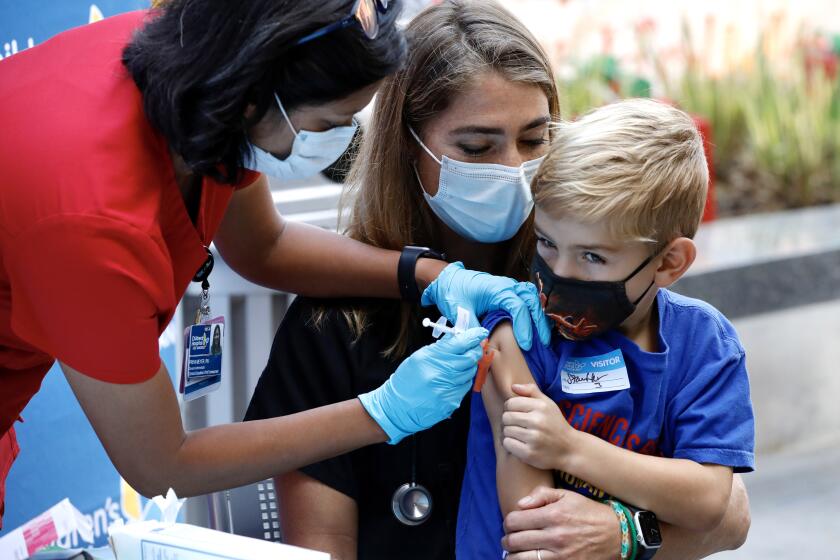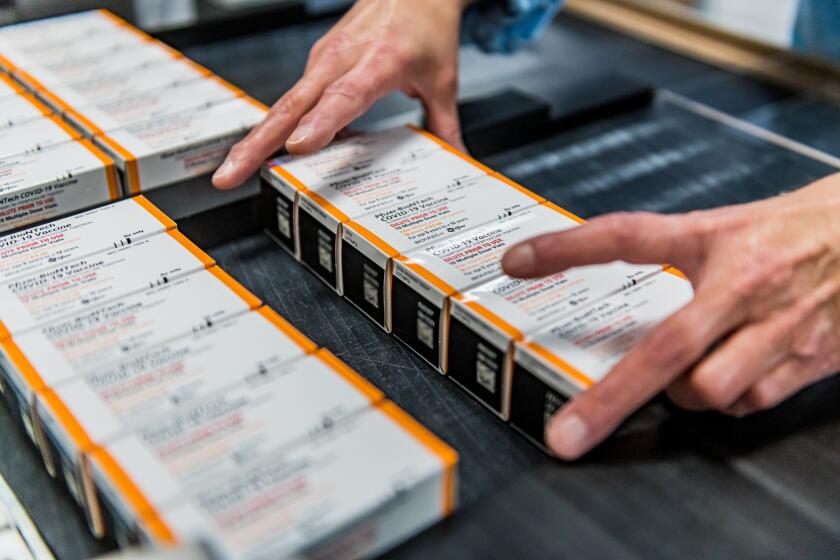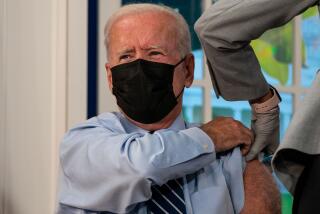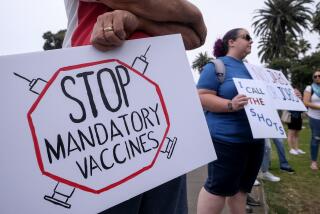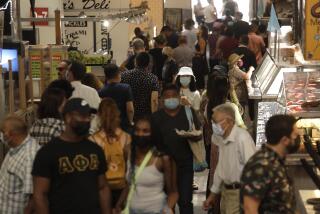Op-Ed: My 8-year-old has been anxiously waiting to get vaxxed. His time has arrived
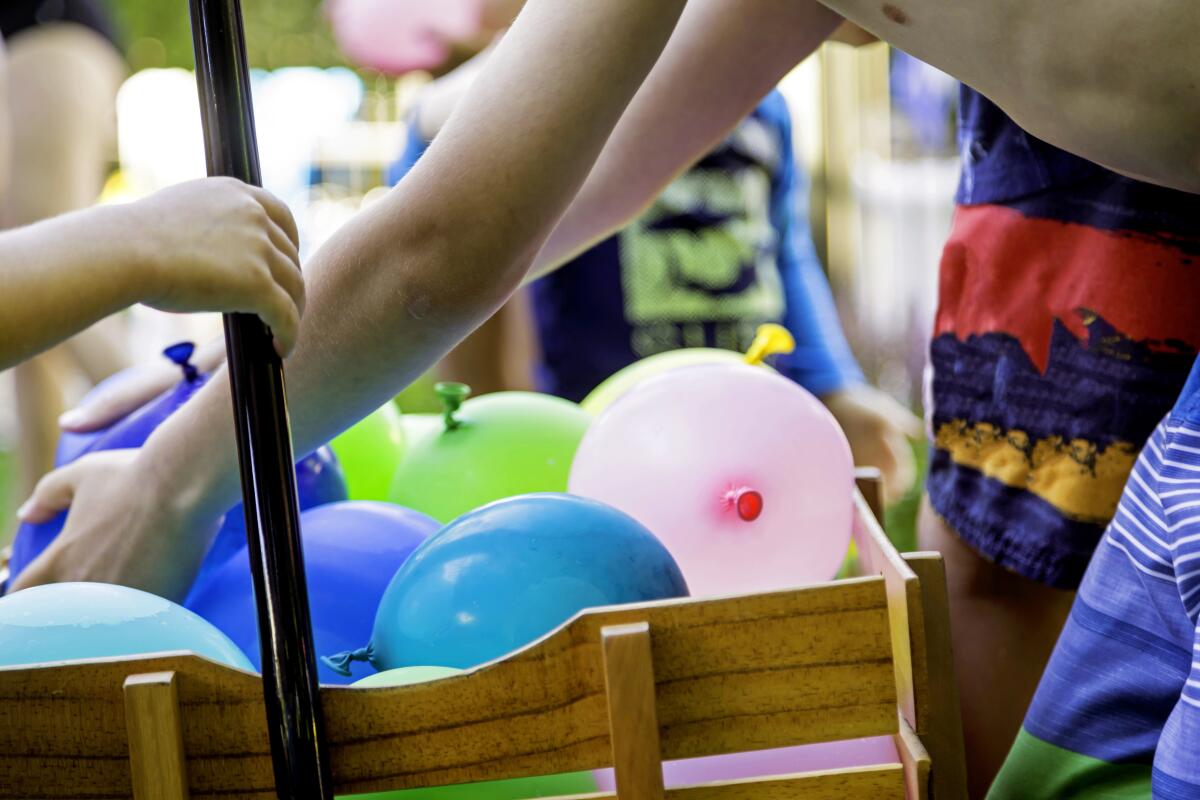
“What’s the first thing you’ll do when you’re vaccinated?”
That question was asked across traditional and social media when people ages 12 and up started getting vaccinated for COVID-19. I saw answers from adults that ranged from “Hug my friends” to “Get a massage” to “Go to Europe.” But I also saw other answers that were less dreamy and ecstatic.
Answers from parents who knew their lives likely wouldn’t change much with their children under age 12 still ineligible for vaccines and therefore vulnerable, were more along the lines of “Nothing different until we’re all vaccinated,” — especially as the Delta variant encroached everywhere.
But now that the Centers for Disease Control and Prevention has approved COVID-19 vaccines for kids ages 5-11, many more families, including mine, can start contemplating the question in earnest.
California officials launched an ambitious rollout Wednesday of COVID-19 vaccinations for kids ages 5 to 11.
My 12-year-old has been having masked, outdoor hangs with his friends for about a year now, and this past summer the group started planning the big party they would throw when they were all vaccinated. There will be a water balloon fight, a band they’re starting, and junk food eaten without masks. All of them were finally vaccinated this fall, so it seemed like they could start filling those water balloons.
And yet.
That vaccinated, party-planning 12-year-old of mine has an unvaccinated 8-year-old brother, who he has been pretty protective of since the pandemic started. His caution applied to all of us. He avoided friends who didn’t mask up around him. He monitored everyone’s hand washing, even mine. And he drew closer to his little brother.
To some degree, our entire family became closer, especially when my 8-year-old’s fascination with hummingbirds drew us all in. I stuck feeders on windows and filled them with homemade nectar. Whenever we saw “Ruby,” as we named one (or, likely multiple) thrumming, thirsty visitor appear at a window, we’d bellow out for everyone to come see. There would be a small stampede followed by faces smashed against glass as we’d make hushed, Attenborough-esque observations about feather color and patterns. We’d silent-scream over the bifurcated tongue we learned about from multiple “NOVA” episodes. We became hummingbird nerds.
Our hummingbirds were something to focus on. Something to discuss and delight in. Something that brought joy and flutterings of hope.
As the pandemic wore on and we all retreated to our separate spaces in the house to work or for distance learning, my 8-year-old felt crushingly lonely. He’s someone who doesn’t want downtime of the solitary sort. He wants to be in the middle of every joke, every conversation, every hug. He doesn’t quite understand that even people who love each other need separation. And he started to feel very left out as the rest of us tried to reclaim some of our “alone time.”
That left-out feeling increased when he became the only unvaccinated member of the family. Even though he went back to in-person, mask-mandated school last fall and got to be among his dearly missed friends, he couldn’t help but feel like the odd one out in our home.
When you ask my youngest what he’s going to do once he’s vaccinated, he’ll say stoutly: “Not worry about dying.”
And that’s why my 12-year-old hasn’t yet proceeded with the party with his friends. He’s protecting his little brother in every way that he can.
But now it’s possible, even likely, that water balloons will splatter on the fall-warmed pavements outside our California home very soon. Including some hurled by his vaccinated little brother who will stop worrying about dying. (For now.)
An appointment for my youngest to get his first dose is already scheduled.
The CDC’s vaccine advisory panel weighed the risks and benefits of Pfizer and BioNTech’s COVID-19 vaccine for young children.
Then maybe our family can finally eat at a restaurant together or have visits and hugs from out-of-state grandparents. Maybe we’ll stop wiping down our groceries and I’ll stop wearing masks on my runs.
I’m sure it won’t be long till I feel the pressure to plan parties and increase my school volunteering hours. I’ll wince a bit at the change. Because there are other side effects of “returning to normal” outside of vacations and hugs.
After two years of being intensely on guard, there will be anxiety hangovers that will affect many of us, children included. And when safety measures inevitably start being reduced, how will that affect the immunocompromised people in our community?
For the more introverted, “getting back to normal” may be socially exhausting. Reengagement with the community comes with concerns that we’ve forgotten how to hold normal conversations and interactions. Quite frankly this is a concern even among extroverted people like me. A fellow shopper recently complimented my eye shadow and instead of saying, “Thank you,” I blurted, “Happy birthday!”
But just now, Ruby appeared outside.
I called out to my family. Leaning against the window frame, my 12-year-old informed me that when everyone is vaccinated he’s going to start a drink company called “Cool Drinks.” His brother will help him.
Stephanie V.W. Lucianovic writes books in California surrounded by a few kids, a few cats and one husband. Her most recent book is “The League of Picky Eaters.” @grubreport
More to Read
A cure for the common opinion
Get thought-provoking perspectives with our weekly newsletter.
You may occasionally receive promotional content from the Los Angeles Times.
